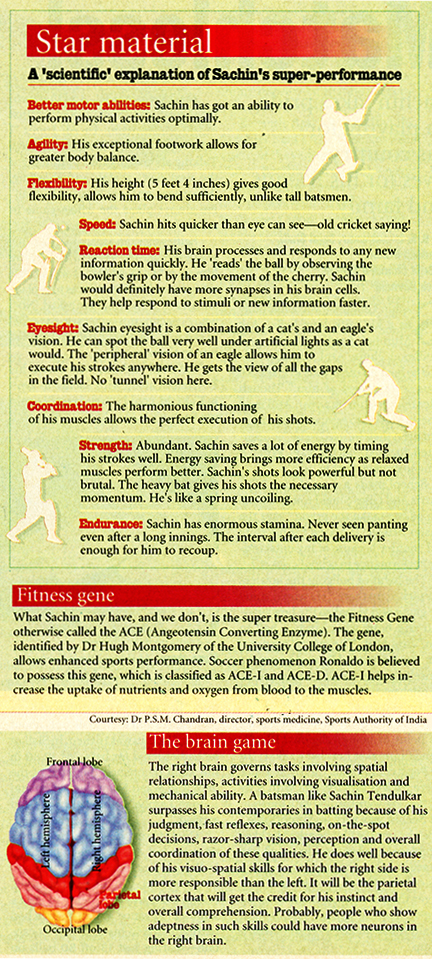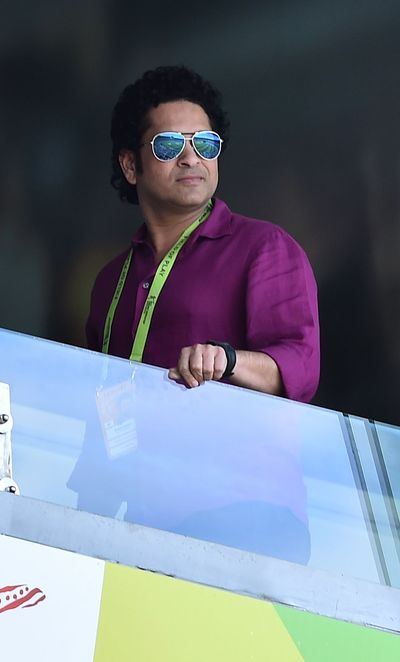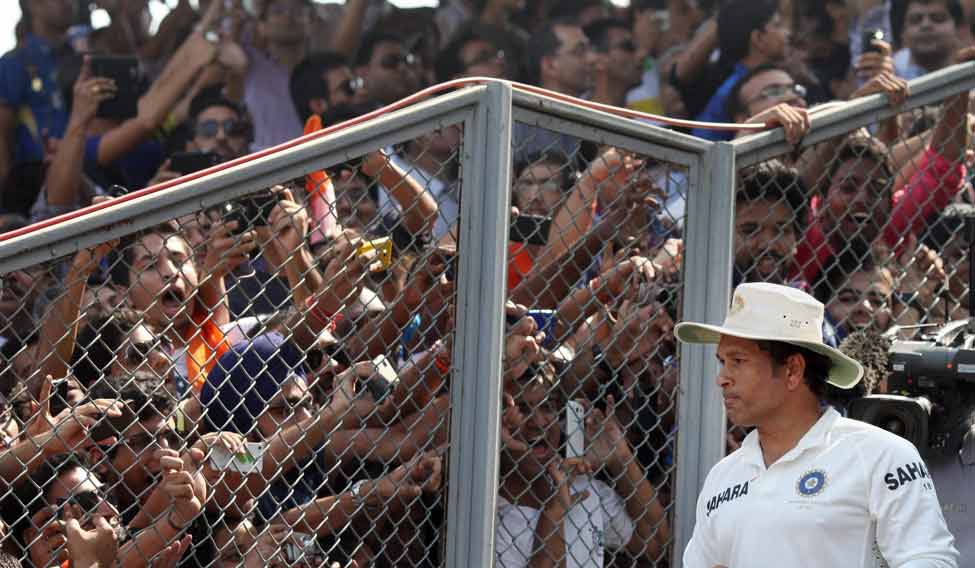In an era of painful social change Sachin Tendulkar's persona has an inspiring incandescence: it lends hope and meaning in life for million of Indians who rejoice in his triumphs and console themselves–whenever he fails–that he would surely do better next time. It is a cathartic experience for them.
All attempts to understand Sachin's 'being' would be woefully incomplete without his cathartic sharing. Since I have had no occasion for that, this article is an attempt to explain the essential characteristics of a young man from my interaction with his friends and neighbours at Sahitya Sahawas.
Sachin as a child explored the environment around him unlike today's children who live in structured surroundings most of the time. He had uninhibited access to homes, trees and playgrounds, and the freedom was tempered by the intellectual culture at Sahitya Sahawas Colony, his home in Bandra, Mumbai.

Sachin, photographer Avinash Gowariker and contractor Sunil Harshe were a terrible trio of uncontrollable energy at Sahitya Sahawas two decades ago. "One Sunday while everyone was watching the movie Guide Sachin and I found each other on the same branch of a mango tree,” says Sunil. “It broke sending us down with a thud, which alerted an elderly neighbour, and we ran for our lives.”
During summer vacations the trio was irrepressible from early morning till late night, playing cricket and a host of other games like viti dandi and shigrupi. Sachin lay in wait for the kill while playing hide-and- seek: he would hide when it was his turn to seek, waiting for the others to come out, so he could catch them.
Sahitya Sahawas was still being built those days and the boys delighted in making booby-traps in the heaps of sand and bricks lying around. They also flitted around on a rented bicycle but there were still extra calories to be burnt. And this Sachin did with physical fights: whenever he was introduced to a new friend Sachin would challenge him to beat him. Few could.
He has alway been positively aggressive, raring to spar with a mightier opponent all the time, but never displaying a destructive trait. He was mischievous but capable of deep affection, says Laxrnibai Gije, his nanny for 11 years. He enjoyed every minute of his childhood, and his family and friends provided him with security which probably is the sole factor behind his sense of freedom at the crease.
He could be tough but not insensitive. Sunil give an instance of the abundant caring quality in him: "Playing 'dummy' on a summer evening in Sachin's house we were hiding under blankets and he was to identify us by touch. He wouldn't let us switch on the fan even though it was very hot. He was afraid that the pigeons in the nest there would get hurt.”
A year ago while the Indian team was practising at the Wankhede Stadium, Sachin spent much time bowling underarm to a child who was suffering from a fatal illness. "His last wish was to play with Sachin," says Prof. Ratnakar Shetty, secretary of Mumbai Cricket Association. Sports journalist Makarand Waingankar recently invited Sachin to be the chief guest at an under-14 Elf tournament. He turned up half an hour early, and was extremely friendly with the kids. “Not many cricketers would do that,” says Waingankar.

Sachin's toughness emanates from the training by his coach Ramakant Achrekar: it is an attitude practised over the years and now it is a part of him. He is at his best when he is natural and free of all shackles. He does not have to grimace, stare or shout but just be what he is, enjoying every moment–and that is what the people view as toughness. He is toughest when he is enjoying the most.
For him toughness means fulfilment, fun, shouldering responsibility and not being reckless. It indicates the inner peace he enjoys as a result of fulfilling relationships with friends, teammates and family.
Family support and values have contributed much to the making of Sachin. "He is realistic, simple and sincere. Money has not gone to his head. He is caring and jealou sly guards his private life," says a very close relative.
Even after Sachin became a legend his father continued his association with his old cultural associations, and his mother retained her job with the LIC. The family has practised a value system with rigour.
When someone asked Sachin why he did not move from the middle-class Sahitya Sahawas, he replied that it was where he grew up and where he could be close to his family, Sahitya Sahawas also affords him the freedom to move around in shorts without being mobbed; here he can have his private emotional space and feel secure. His wife Anjali attends all functions in Sahitya Sahawas and daughter Sara's first birthday on October 12 drew all the children and their mothers in the colony to the Tendulkar home.
Sachin's parents gave a room to a family friend in their small house for a whole year as he had no place to live at that time. There are many such instances which reveal the family's sound value system which has had a deep impact on Sachin. Even today when he comes to play table tennis, he waits for his turn; and while playing cricket in the colony he is prepared to field and bowl with the kids there.
This was one kid who was really determined. As Sahitya Sahawas was a writer's colony there was a strong temptation to keep him away from cricket. But by the time he was 10 he had a cricket bag bigger than him and he would start his practice at 6 a.m. When he was 11 he moved in with his paternal uncle to concentrate on cricket. The commitment to the game never weakened. “Last May he practised alone at the nets for three days to prepare for a match against a team of calibre of Bangladesh,” says Shetty.
Faith is central to Sachin's psyche. A firm believer in himself and in God, he frequents the Shivaji Park Ganesh mandir, and his cricketing kit has an embossed image of the Lord. "After we had done badly in Sri Lanka Sachin and I had planned to visit the Ganapati Temple at the G.S.B. Hall at Wadala," says Shetty. "As he had to go to Toronto to play against Pakistan I visited the temple on our behalf. When India won 4-0 Sachin called up from Canada and thanked me for visiting the temple."
Sachin's faith in India is there for all to see. He is the only cricketer who sports the tricolour on his helmet and he wants all others to do so. He was terribly upset when someone invert ed the tricolour during the Asia Cup at Colombo. He touches the soul of India. He is our best anti-depressant.
It is his faith in values, God and the country that makes him a clean cricketer untouched by controveries. It is one reason why he is reluctant to appear on liquor ads. He stands apart, giving of his best. And the best of his contributions is being a national unifier at a time when cynicism and divisive mentality are gaining ground. He acts as a great binder, a superglue.
With his flair on the field Sachin reminds us of our self-esteem. Each century of his proves his conviction that Indians are no way inferior to anyone. When riches are becoming the only mark of success in a country that has cherished austerit, he shows that wealth and good values can co-exist.

He offers solace through his innocence, talent and ability to take on the world's best. He is warm yet aggressive, friendly but fiercely competitive, enlightened but approachable. He may not love to debate about Amartya Sen but he is emotionally intelligent. His state of being is more prowerful than the tallest intellectuals of the country.
He learnt art of poise from the other little master . At age 14 when Sachin was disappointed on not getting the prize of the best school cricketer of the year, Sunil Gavaskar soothed him with a letter whose gist was, 'When you see the records of cricketers who have won the prize, you will see one name is missing, one who has proved everybody wrong. Hence, do not worry.” He has not forgotten the lesson and never makes a mistake twice.
A constant learner, Sachin is also a good guide. Amit Pagnis, who captained the under-19 team for the World Cup 1997, says, “Sachin clarifies our doubts gently as an equal and not from a pedestal." Veteran cricketer Hemant Kanitkar relates how his son Hrishikesh found Sachin inspiring: "Sachin kept saying,'We can do it, and we will do it,' after Pakistan had scored 313 against India at a one-dayer in Dhaka."
Most achievers build their cerebral software early in life and do not greatly modify it later. Sachin is a constant learner who does not hesitate to change the chips. He competes with himself all the time, teasing and quarelling with Sachin of the previous day.
Early in life he learnt the importance of being human. The dehumanising environment that envelops celebrities has had little impact on him as he is surrounded by people who are equally human. He is himself in their presence: he can be vulnerable before them, shed tears and replenish his emotional energy bank.
Sachin does not carry the burden of being politically correct. This is not because he is a genius but because he is genuine. It is not part of his cerebral software. Though courteous, he focuses his energies on the chosen field of activity and allows records to tumble on their own. Like Arjun, he only sees the eye of the fish.






